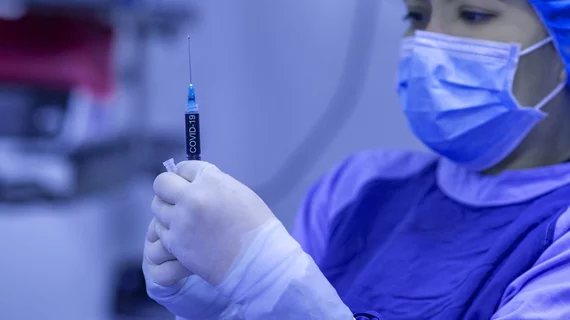4 key takeaways from an updated look at vaccine-related myocarditis in the US
Myocarditis, one of the most serious side effects of COVID-19, has also been associated with COVID-19 vaccines. But how common, exactly, is vaccine-related myocarditis? How does it compare to a typical case of myocarditis?
A team of researchers aimed to answer those questions, evaluating more than eight months of data and sharing its findings in JAMA.
“Onset of myocarditis typically follows an inciting process, often a viral illness; however, no antecedent cause is identified in many cases,” wrote lead author Matthew E. Oster, MD, a CDC representative who also works for the School of Medicine at Emory University in Atlanta, and colleagues. “It has been hypothesized that vaccination can serve as a trigger for myocarditis; however, only the smallpox vaccine has previously been causally associated with myocarditis based on reports among US military personnel, with cases typically occurring seven to 12 days after vaccination.”
Oster et al. examined the Vaccine Adverse Event Reporting System (VAERS), a national reporting system co-managed by the CDC and FDA, and identified more than 1,600 cases of vaccine-related myocarditis. All patients received either the Pfizer-BioNTech vaccine or the Moderna vaccine from December 2020 to August 2021.
These are four key takeaways from the group’s analysis:
1. 82% of vaccine-related myocarditis cases occurred after the second vaccine dose
Also, the team added, the median time from vaccination to symptom onset was three days when linked to the first dose, but two days when linked to the second dose. Nearly three in four cases occurred within seven days of vaccination.
2. Young men face the highest risk
Vaccine-related myocarditis is most commonly seen in younger patients, with 73% occurring in patients younger than 30 years old and 33% occurring in patients younger than 18 years old. Also, 82% of patients were men.
3. There are some important differences between vaccine-related myocarditis and other cases of myocarditis
Vaccine-related cases, for example, seem to lead to symptom onset quicker than typical cases.
“Cases of myocarditis reported after COVID-19 vaccination were typically diagnosed within days of vaccination, whereas cases of typical viral myocarditis can often have indolent courses with symptoms sometimes present for weeks to months after a trigger if the cause is ever identified,” the authors wrote.
Also, the “major presenting symptoms” associated with myocarditis resolve faster in vaccine-related cases than typical cases.
“Even though almost all individuals with cases of myocarditis were hospitalized and clinically monitored, they typically experienced symptomatic recovery after receiving only pain management,” the authors wrote. “In contrast, typical viral cases of myocarditis can have a more variable clinical course. For example, up to 6% of typical viral myocarditis cases in adolescents require a heart transplant or result in mortality.”
4. We still need more data
Long-term outcomes data, the authors noted, are still not available. The CDC is actively working to gain additional information about prior cases, but such reporting will take time.
The full JAMA study is available here.
More stories examining this topic can be found here and here.

